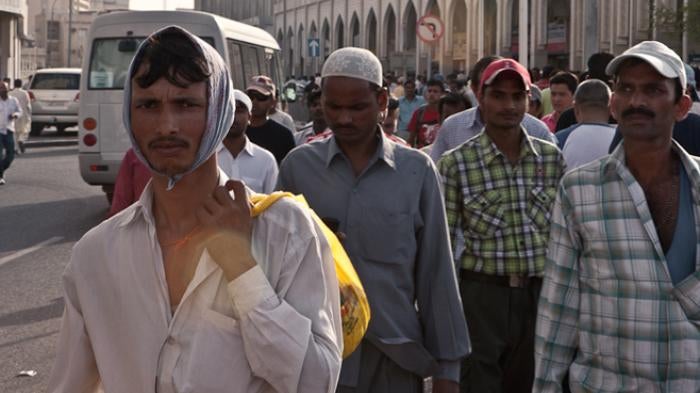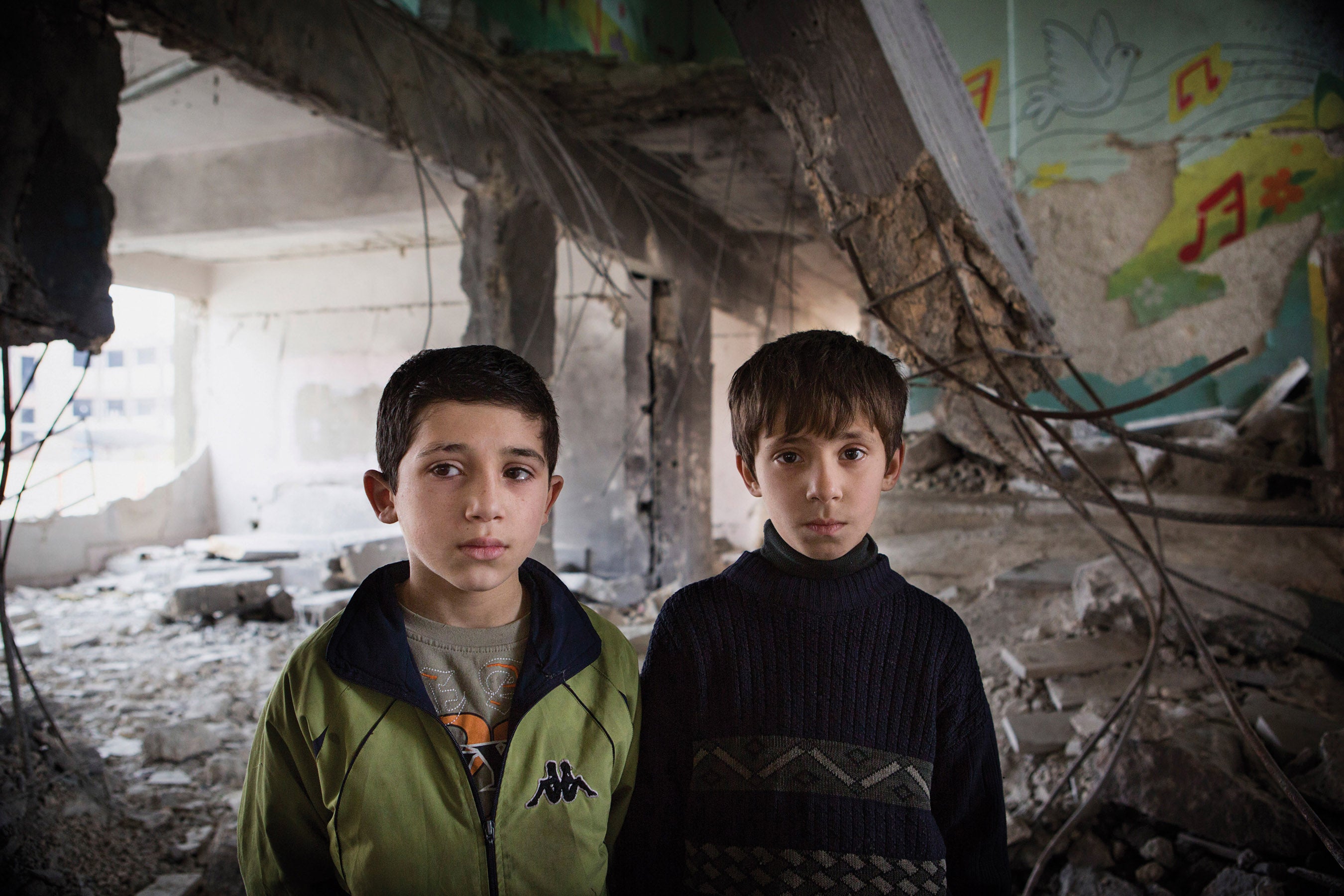Unlike most other Gulf states, Qatar has not experienced serious domestic unrest. Yet the human rights climate remains problematic, particularly for the large and growing migrant worker population. Migrants continue to experience serious rights violations, including forced labor and arbitrary restrictions on the right to leave Qatar, which expose them to exploitation and abuse by employers. Qatar’s poor record on freedom of expression declined further with the announcement of a draft cyber crime law.
Migrant Workers’ Rights
Qatar is upgrading its infrastructure in preparation for the 2022 FIFA World Cup, but authorities have yet to implement reforms that are needed to afford foreign migrant workers adequate protection against serious rights abuses, including forced labor and trafficking.
According to official 2013 statistics, Qatar has a population of about 2million, of whom only 10 percent are Qatari nationals. The number of economically active foreign nationals increased by 122,000, almost 10 percent, in the 12 months from April 2012, and is expected to rise further in response to the demands of Qatar’s burgeoning construction sector.
Qatar’s Law 14 of 2004 regulating labor in the private sector limits workers’ hours requires that they receive paid annual leave, sets requirements on health and safety, and requires on-time payment of wages each month. However, the authorities fail to enforce this and other laws intended to protect workers’ rights.
Workers typically pay exorbitant recruitment fees and employers regularly take control of their passports when they arrive in Qatar. The kafala (sponsorship) system ties a migrant worker’s legal residence to his or her employer, or sponsor. Migrant workers commonly complain that employers fail to pay their wages on time if at all, but are barred from changing jobs without their sponsoring employer’s consent other than in exceptional cases and with express permission of the Interior Ministry. Adding to their vulnerability, they must obtain an exit visa from their sponsor in order to leave Qatar. Migrant workers are prohibited from unionizing or engaging in strikes, although they make up 99 percent of the private sector workforce.
Many migrant workers live in cramped, unsanitary conditions, especially those working without documentation.
Workers can become undocumented when employers report them as having absconded, or when they fail to pay to renew workers’ annual ID cards. A lack of proper documentation leaves workers at risk of arrest and detention or deportation. It also leaves them at risk of further labor exploitation. Authorities rarely, if ever, bring criminal prosecutions against employers for violating Qatar’s labor or anti-trafficking laws.
In May 2013, the Qatar Foundation, a quasi-governmental organization heavily engaged in property development, announced a code of conduct relating to workers’ conditions that it requires contractors and sub-contractors on its projects to respect. Another quasi-governmental organization, the 2022 Supreme Committee, plans to follow suit for projects related to the World Cup. These codes, if properly enforced, would improve conditions for workers on certain projects and possibly bring them up to internationalminimum standards. However, they are no substitute for enforced state-led regulation and they will not alleviate conditions for most of Qatar’s low-paid migrant workers, since these projects constitute only a fraction of those ongoing in Qatar.
Domestic migrant workers, almost all women, are especially vulnerable. In addition to the problems the general migrant worker population face, they are also subject to verbal, physical, and in some cases, sexual abuse. Some are not allowed to speak to strangers or are locked up in the homes where they work. Many do not receive a day off. They are not afforded any protection under Qatari labor law, which could provide them with days of rest and limit their working hours among other measures. A regional unified contract for domestic workers, expected to be approved in 2014, falls well short of the minimum standards outlined in the recently adopted International Labour Organization’s Domestic Workers’ Convention.
Freedom of Movement
A number of foreign professionals working as expatriates in Qatar complained they were unable to leave the country because their employers failed or refused to issue them exit visas.
Law No. 4 of 2009, which regulates the sponsorship, employment, and residence of expatriate workers, requires they obtain residence permits, and exit permits when they wish to leave the country. Under the kafala system, these permits are provided by “residence sponsors,” who can effectively prevent those they sponsor from leaving Qatar.
The law does not require residence sponsors to justify their failure to provide an exit permit, instead placing the onus on the sponsored expatriate to find another Qatari national willing to act as an exit sponsor. Alternatively, the expatriate must publish a notice in two daily newspapers and then provide a certificate 15 days later showing that he or she faces no outstanding legal claims. The exit visa requirement cannot be justified as a means of preventing foreigners fleeing court cases in Qatar, as the Interior Ministry has separate powers to impose travel bans on non-citizens facing criminal charges or civil claims in Qatar’s courts.
There are also concerns over the arbitrary manner in which Qatar imposes indefinite travel bans against individuals accused of criminal or civil offences by their employers.
The exit visa requirement and the authorities’ use of arbitrary travel bans means that Qatari employers can prevent their foreign employees from leaving Qatar indefinitely, a power they may use unfairly to secure concessions from foreign employees with whom they are in dispute. Formerly highly-paid expatriates trapped in Qatar in 2013 included the French professional footballer, Zahir Belounis, and three former employees of the Al Jazeera Children’s Channel.
Freedom of Expression
In February, an appeal court reduced to 15 years the life imprisonment sentence imposed on poet Mohammed Ibn al-Dheeb al-Ajami, a Qatari national, in November 2012, by a court in Doha. The court convicted him of incitement to overthrow the regime after he recited poems critical of Qatar’s then-emir, Sheikh Hamad bin Khalifa al-Thani. In June 2013, the emir abdicated, handing power to his son, Sheikh Tamim bin Hamad al-Thani.
In May, Qatar’s cabinet approved a draft cyber-crimes law, but it remained unclear when it would be enacted. The authorities did not consult the state-funded Doha Center for Media, whose role is to promote media freedom in Qatar, when preparing the draft law and they did not disclose its full contents.
According to state media, however, it “punishes anyone who infringes on the social principles or values or otherwise publishes news, photos, audio or visual recordings related to the sanctity of the private and familial life of persons, even if they were true; or infringes on others by libel or slander via the Internet or other information technology means.” As yet, authorities have also not enacted a problematic draft media law of 2012 that would expose journalists in Qatar to prohibitive financial sanctions if they criticize any Gulf Cooperation Council states.
Provisions of Qatar’s penal code are inconsistent with international free speech standards. Article 134, for example, prescribes a penalty of up to five years’ imprisonment for anyone who is convicted of criticizing the emir or vice-emir.
Women’s Rights
Provisions of Law No. 22 of 2006, Qatar’s first codified law to address issues of family and personal status law, discriminate against women. Article 36 states that two men must witness marital contracts, which are concluded by male matrimonial guardians. Article 57 prevents husbands from hurting their wives physically or morally, but article 58 states that it is a wife’s responsibility to look after the household and to obey her husband. Marital rape is not a crime.





